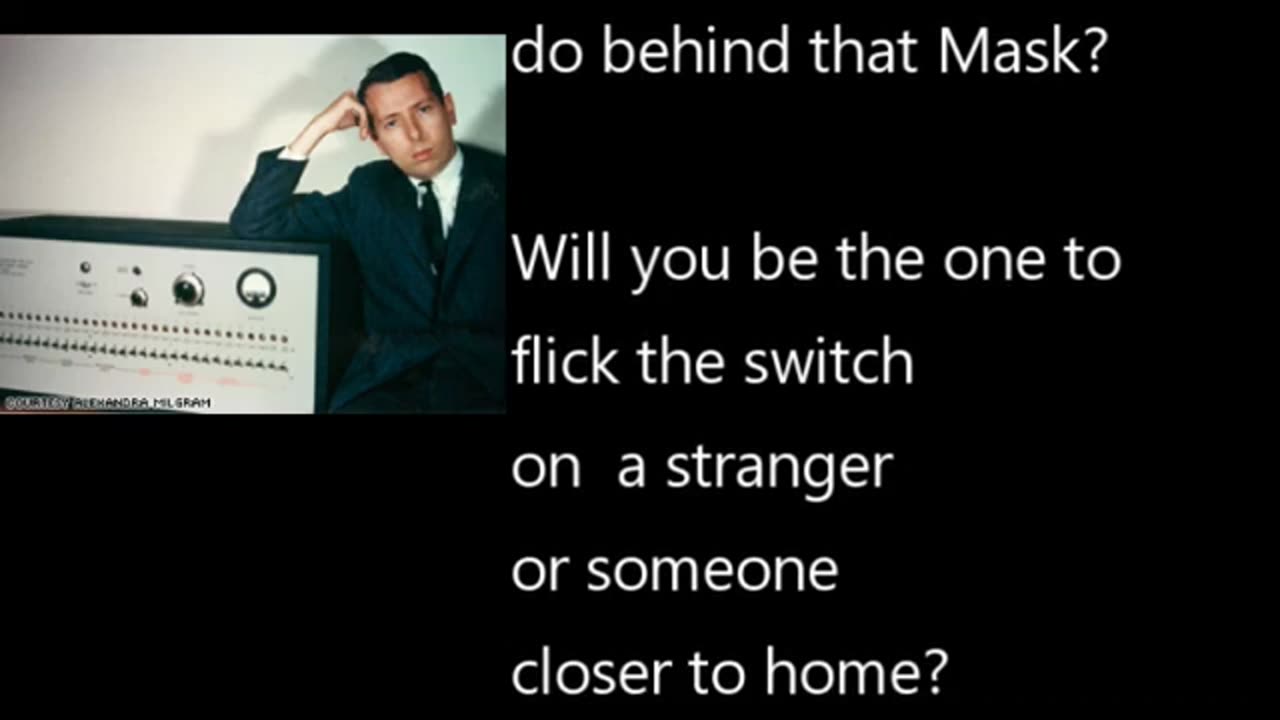Premium Only Content

Milgram Experiment 2020 - A fireside chat.
https://dksdata.com/Milgram2020
"Ask not why they would do this, but rather, why you would let them."
Stanley Milgram was a Yale psychologist who was interested in trying to understand how ordinary people could be influenced into committing atrocities, for example, the German people in WWII. His experiments begin in July of 1961. His conclusions are now more relevant than ever...
The premise of Milgram's research was;
to use a perceived experiment to find out if negative reinforcement helps with learning.
to use an actual experiment to see how people 'follow orders' even when they know their actions may or will cause harm.
to try to explain why and to what extent people would participate in such experiments.
65% of normal people were willing to execute a stranger (by electrocution) with no benefit or danger to themselves. All that was required (on average) for 65% compliance was prompt 1. In 'Academics' that number rose significantly. In some experiments they had 100% compliance.
Please continue.
The experiment requires you to continue.
It is absolutely essential that you continue.
You have no other choice but to continue.
Now imagine what a population would be willing to do if they thought that an unmasked or unvaccinated person would kill them just by getting within 6 feet of them.
The third point is the most important. The long held understanding of the Milgram experiment is that people follow orders through blind obedience only i.e. 'the Nuremberg Defence'.
However, there is a deeper, darker explanation for the participants' actions that was drawn from these experiments.
This relates to a concept called 'Engaged Followship'. This understanding came from debriefs of the participants after the experiment.
These participants had been willing to place another human being in harm's way, right to the point of ending their life, with the flick of a switch.
-
 9:15:09
9:15:09
BrancoFXDC
12 hours ago $9.11 earnedHAPPY NEW YEARS - Road to Platinum - Ranked Warzone
96.4K4 -
 5:53
5:53
SLS - Street League Skateboarding
5 days agoBraden Hoban’s San Diego Roots & Hometown Win | Kona Big Wave “Beyond The Ride” Part 2
99.9K13 -
 6:03:57
6:03:57
TheBedBug
16 hours ago🔴 LIVE: EPIC CROSSOVER - PATH OF EXILE 2 x MARVEL RIVALS
100K9 -
 1:12:45
1:12:45
The Quartering
14 hours agoTerror In New Orleans, Attacker Unmasked, Tesla BLOWS UP At Trump Tower! Are We Under Attack?
165K261 -
 1:32:08
1:32:08
Robert Gouveia
16 hours agoNew Year TERROR; Trump Speaks at Mar-a-Lago; Speaker Johnson FIGHT
135K112 -
 22:21
22:21
Russell Brand
1 day agoVaccines Don't Cause Autism*
204K885 -
 2:05:27
2:05:27
The Dilley Show
15 hours ago $26.99 earnedNew Years Agenda, New Orleans Terror Attack and More! w/Author Brenden Dilley 01/01/2025
119K39 -
 25:45
25:45
Outdoor Boys
3 days ago3 Days in Arctic Survival Shelter - Solo Bushcraft Camping & Blacksmithing
86.9K27 -
 2:59:05
2:59:05
Wendy Bell Radio
22 hours agoAmerica Is Back
132K138 -
 1:45:57
1:45:57
Tucker Carlson
5 days agoAaron Siri: Everything You Should Know About the Polio Vaccine, & Its Link to the Abortion Industry
170K201